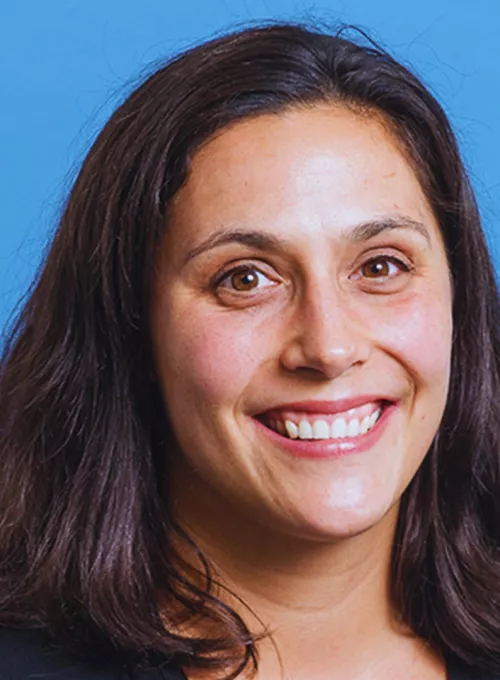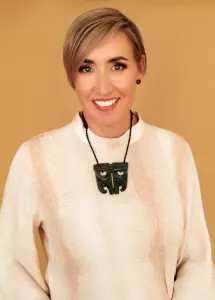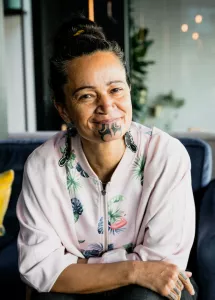Dr Kirsten Smiler
Te Whānau a Kai, Te Aitanga-a-Māhaki, Rongowhakaata, Te Whakatōhea, Ngāti Kahungunu

MA, PhD
Dr Kirsten Smiler is a distinguished Māori health researcher and lecturer at Te Herenga Waka—Victoria University of Wellington. Her personal experiences as a wāhine Māori and a Child of Deaf Adults (CODA) have profoundly influenced her dedication to health equity and the empowerment of tāngata whaikaha Māori (Māori with disabilities).
Kirsten’s MA (VUW – Applied Linguistics) completed in 2004 critically examined perceptions of cultural and linguistic identity for Māori members of the New Zealand Sign Language (NZSL) community. Dr Smiler achieved her PhD from Victoria University Wellington in 2014, focusing her research on the nature and impacts for Māori Deaf/hearing-impaired children and their whānau in the Universal Newborn Hearing Screening and Early Intervention Programme (UNHSEIP). This work provided critical insights into the intersection of culture, language, and disability, highlighting the unique strengths and insights of Māori deaf people and their whānau, and the challenges that our services and systems must overcome to support equity and equality.
In her current role is as a Senior Lecturer and Manutaki Takirua/Co-Director of Te Hikuwai Rangahau Hauora, the Health Services Research Centre, Dr Smiler is committed to fostering a culturally responsive learning environment. She integrates kaupapa Māori methodologies into her teaching and research, ensuring that Indigenous perspectives are central to health discourse. Her work emphasizes the importance of culturally grounded approaches in health services and policy development.
Dr Smiler's research contributions are extensive and impactful. She has been involved in various health services research projects, particularly those addressing health inequities faced by Māori and disabled communities. Her publications reflect a deep commitment to decolonizing disability research and promoting Indigenous methodologies. Notably, she co-authored the chapter "Decolonizing Disability: Indigenous Māori Perspectives of Disability Research in the Modern Era," which explores Māori-centered understandings of disability and critiques Western epistemologies.
In 2014 Kirsten was awarded the Health Research Council of New Zealand (HRC) Erihapeti Rehu-Murchie Post-Doctoral Research Fellowship in Māori health, and in 2016 the HRC Award for Excellence in research for an emerging researcher, in recognition of her contributions to Māori health research. This funding supported her ongoing work to improve health outcomes for Māori, particularly in the context of disability. Her research aims to inform health policy and practice, ensuring they are inclusive and equitable for all communities.
In 2024 Kirsten was one of the HRC Māori Health Research Emerging Leader Fellowship recipients for her 2-year research project ‘Whāia te ōritetanga o Ngāti Turi: Health equity and equality for Ngāti Turi.’
Dr Smiler's work exemplifies a profound dedication to advancing health equity and Indigenous methodologies. Her contributions continue to inspire and empower, reflecting a steadfast commitment to the well-being of Māori and disabled communities in Aotearoa and beyond.
Links:
Health Research Council: The next generation of Māori and Pacific health research leaders profile
Research Gate Profile: Kirsten Smiler
Expert Witness to the Waitangi Tribunal Health Inquiry (Wai 2575) and claim on behalf of Ngāti Turi (Māori Deaf) (Wai 2143) Dr Kirsten Smiler Summary of “KEI AAKU RINGA”: TE MANA MOTUHAKE O NGAATI TURI Dated: 20 January 2023
Recent Publications:
Ingham, T., Jones, B., King, P.T., Smiler, K. Tuteao, H., Baker, G. Hickey, H. (2024). Decolonizing Disability: Indigenous Māori Perspectives of Disability Research in the Modern Era. In: Rioux, M.H., Buettgen, A., Zubrow, E., Viera, J. (eds) Handbook of Disability. Springer, Singapore. Chapter Abstract
Morris C., McDonald J., Officer T.N., Tanuvasa A.F., Smiler K., Parore N., Dunn P., McKinlay E., Kennedy J., McBride-Henry K., Cumming J. (2024). A realist evaluation of the development of extended pharmacist roles and services in community pharmacies. Research in Social and Administrative Pharmacy. 20 (3). 321-334. Full text Journal article
Lynne Russell et. al, (2023). Cohort profile: Ngā Kawekawe o Mate Korona| Impacts of COVID-19 in Aotearoa – a prospective, national cohort study of people with COVID-19 in New Zealand, 10 Jul 2023. BMJ Open.13(7). Full Text Journal Article.
Russell, L., Levy, M., Barnao, E., Parore, N., Smiler, K. Boulton, A. (2023). Enacting Mana Māori Motuhake during COVID-19 in Aotearoa (New Zealand): “We Weren’t Waiting to Be Told What to Do”. International Journal of Environmental Research and Public Health 20(8). Open access Journal article.
Bowden, N. et.al. (2022). Criminal justice system interactions among young adults with and without autism: A national birth cohort study in New Zealand. Autism 26 (7). 1783-1794. Full text Journal Article
Jeffreys, M Smiler, K. et al. (2022). Consequences of barriers to primary health care for children in Aotearoa New Zealand. SSM - Population Health (17). Link to full text article
Smiler, K., Stace, H., & Sullivan, M. (2022). Designing qualitative research for disability rights approaches. In U. Flick (Ed.) Designing Qualitative Research for Disability Rights Approaches (Vol. 2, pp. 1146-1162). SAGE Publications Ltd, https://doi.org/10.4135/9781529770278 Introduction to article.
Russell, L. et.al, (2022). Ngā Kawekawe o Mate Korona | Impacts of COVID-19 in Aotearoa (Prepared for Manatū Hauora | Ministry of Health). Te Hikuwai Rangahau Hauora | Health Services Research Centre, Te Herenga Waka-Victoria University of Wellington. Links to full text report
McDonald et al. (2021). A national survey of pharmacists and interns in Aotearoa New Zealand: provision and views of extended services in community pharmacies. BMC Health Services Research 21:1147. Full text Journal article
Bowden et al., (2020). Autism spectrum disorder/Takiwātanga: An Integrated Data Infrastructure-based approach to autism spectrum disorder research in New Zealand.Autism 24(8):2213-2227. Full text article.
Jeffreys, M., Irurzun Lopez, M., Russell, L., Smiler, K., Ellison-Loschmann, L., Thomson, M. & Cumming, J. (2020). Equity in access to zero-fees and low-cost Primary Health Care in Aotearoa New Zealand: Results from repeated waves of the New Zealand Health Survey, 1996-2016 Health Policy. 124(11):1272-1279.
8 May 2025



